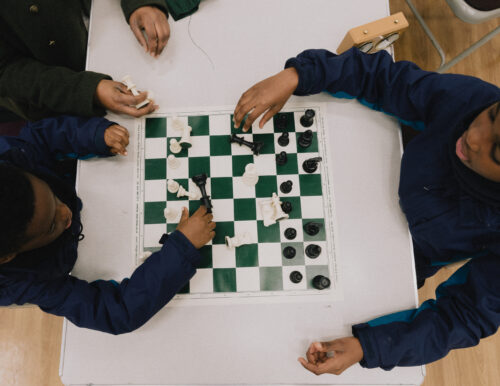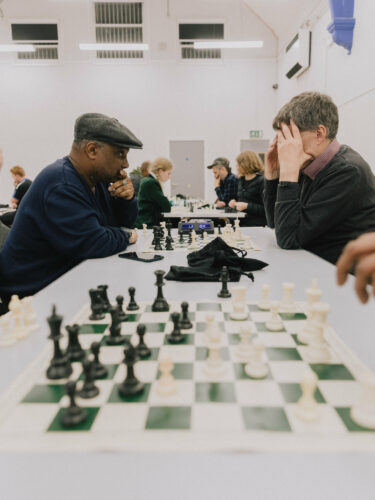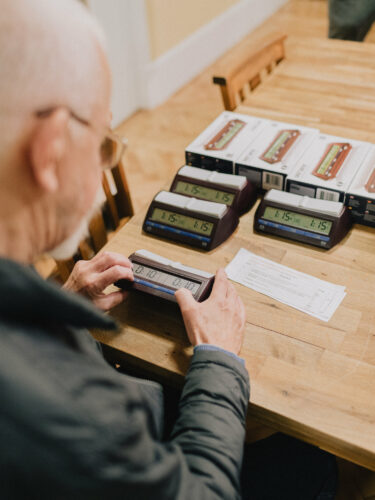
It is a bleak winter Tuesday evening in London: 5pm and already dark, with the wind howling in people’s faces as they hurry along Streatham High Street. But inside the community room at Streatham Library is a cosy and inviting atmosphere. Electric heaters blast against the cold, as the bright lights shine down on around 20 people engrossed in chess games.
This is where the Streatham Library Chess Group meets every week. The sessions are open to any age or ability who wants to play, learn or improve their chess. The group is closely affiliated with the official – and historic – Streatham and Brixton Chess Club, formed through the merger of two separate clubs at the end of the Second World War. The Brixton arm can trace its origins back to 1871 and the Streatham side to the 1880s.
Today’s library attendees are a mix of old and young, with the effect of Netflix’s popular TV series The Queen’s Gambit in obvious action. At least four attendees, in their 20s and 30s, say they took up playing chess after watching the show, playing online during lockdown, but seeking real-life action once the world opened up. Ben, in his mid-20s, says playing in person is so enjoyable “it’s ruined online for me, I don’t play that way anymore, I come here instead.”
 Across the room, Michelle’s face is full of concentration, but flashes with joy after a well-played move. At eight, she is one of the youngest players this evening. Richard Tillett, who is Club Secretary and runs these library evenings, plays with her, offering gentle advice throughout the game. Her mum is delighted Michelle can enjoy a challenging activity that doesn’t require a screen and is free and easy to get to. “It’s lovely that she gets that human connection when playing,” she adds. The youngest of the evening is Josh, who proudly explains that he is six-and-a half, playing with his ten-year-old brother William. Both boys say that their favourite part of chess is “winning”, much to their mother’s amusement.
Across the room, Michelle’s face is full of concentration, but flashes with joy after a well-played move. At eight, she is one of the youngest players this evening. Richard Tillett, who is Club Secretary and runs these library evenings, plays with her, offering gentle advice throughout the game. Her mum is delighted Michelle can enjoy a challenging activity that doesn’t require a screen and is free and easy to get to. “It’s lovely that she gets that human connection when playing,” she adds. The youngest of the evening is Josh, who proudly explains that he is six-and-a half, playing with his ten-year-old brother William. Both boys say that their favourite part of chess is “winning”, much to their mother’s amusement.
These sessions don’t offer official coaching but Richard, and others with experience, are there to help and answer questions as newbies practice. In addition, the younger players keep the older ones sharp, Richard says: “they’re more innovative, they see the game from a different angle.”
An older gentleman from Crystal Palace has been playing chess for decades, enjoying it as “a hobby that challenges your mind”. He started attending the Streatham sessions recently, after his club nearer to home shut down all operations. Post-Covid, the group lost members and, as most clubs run through contributions from members, couldn’t afford to rent a space.
These library sessions are also run on a shoestring budget but are helped by the generosity of Streatham Library, who allow the group to use the community hall for free. Even so, the official Brixton and Streatham Club league matches must be played elsewhere, as they start later in the evening and the library, like many other beleaguered community institutions across the country, does not have the staff to keep the hall open past 8pm. Official chess club membership comes with a fee, so the club is able to rent the cafe at St Thomas’ Church in Streatham Hill for league games.
 These are serious, competitive matches that can be held at home or away, in venues around South London, Surrey and even Central London, depending on the league. Streatham and Brixton Chess Club has a rich history, detailed by club president Martin Smith in his book “Movers and Takers: a chess history of Streatham and Brixton 1871 – 2021”, published to celebrate its 150 year anniversary. The book is full of fun tidbits, such as a news clipping telling of the club “pulling off a shocker” when it beat favourites Cambridge University to win the Legal and General National Chess Club Championship in 1985.
These are serious, competitive matches that can be held at home or away, in venues around South London, Surrey and even Central London, depending on the league. Streatham and Brixton Chess Club has a rich history, detailed by club president Martin Smith in his book “Movers and Takers: a chess history of Streatham and Brixton 1871 – 2021”, published to celebrate its 150 year anniversary. The book is full of fun tidbits, such as a news clipping telling of the club “pulling off a shocker” when it beat favourites Cambridge University to win the Legal and General National Chess Club Championship in 1985.
Back at Streatham Library and those less competitive games, players tell me that they enjoy the chance to not only play chess – which many say “keeps the mind sharp” – but to interact with others in-person in a relaxed environment. This spirit is no more obvious than in 14-year-old Ukrainian refugee Sasha, who shyly explains she has been playing since she was seven and is happy to be playing again. After the storm of the past three years, the efforts of community groups like this could not be more important.




